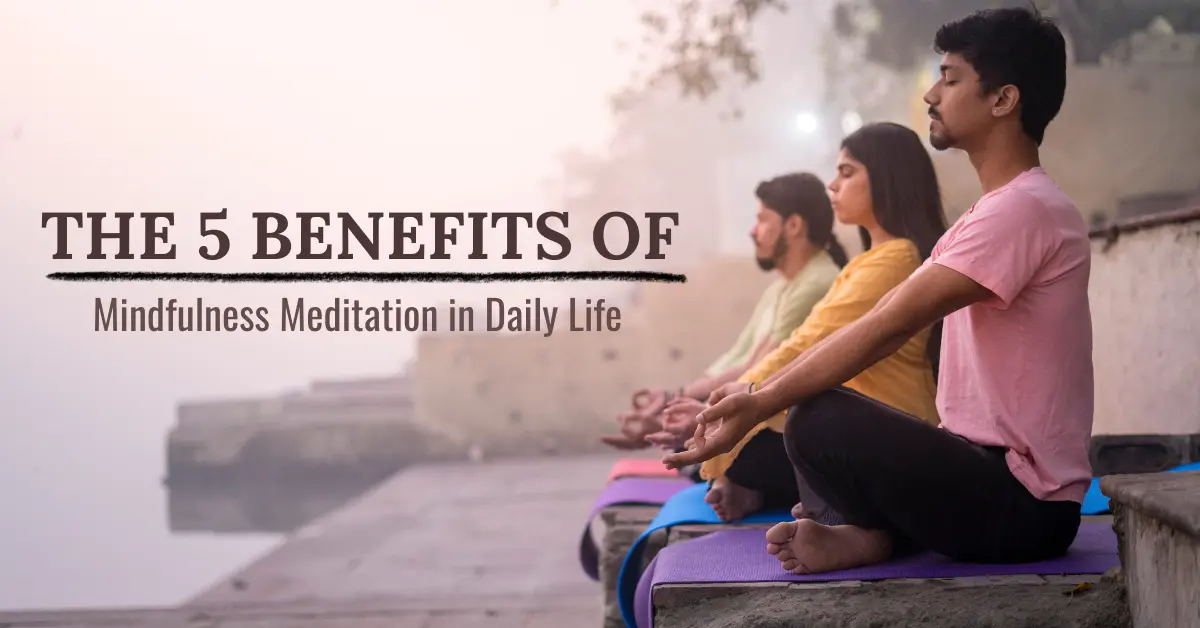
The 5 Benefits of Mindfulness Meditation in Daily Life
- 106
- 0
- 0
Benefits of Mindfulness Meditation in Daily Life
Mindfulness meditation is important because it helps you live in the present moment, reducing stress and anxiety. In daily life, our minds often get overwhelmed with worries about the past or future. Mindfulness meditation encourages you to focus on the “now,” bringing calmness and clarity. It has many benefits, like improving concentration, boosting mood, and enhancing emotional well-being. Regular practice can lead to better sleep, reduced negative thoughts, and a greater sense of peace. Overall, it helps you feel more balanced, relaxed, and connected to your surroundings.
What Is Mindfulness Meditation?
Mindfulness meditation is a practice where you focus on the present moment, calmly observing your thoughts, emotions, and sensations without judgment. It helps to bring awareness to your breathing and surroundings, reducing stress, improving concentration, and promoting mental clarity. Regular practice leads to a more peaceful and balanced state of mind.
The 5 Benefits of Mindfulness Meditation in Daily Life
We all know how busy and stressful modern life can be. Between work, family, and countless other duties, finding peace seems harder than ever. That’s where mindfulness meditation comes in – a simple practice that can make a big difference in how we handle our daily challenges. Let’s look at five benefits of mindfulness meditation in daily life that can help make your life better.
Better Stress Control

One of the biggest benefits of mindfulness meditation is how it helps us deal with stress. When you take time each day to sit quietly and focus on your breath, you’re actually training your brain to stay calm under pressure.
Think about this: how many times have you felt overwhelmed by a work deadline or an argument with someone? Mindfulness teaches you to notice these stressful feelings without getting caught up in them. It’s like watching clouds pass in the sky – you see them, but you don’t have to chase after them.
Some ways mindfulness helps with stress:
- You learn to notice tension in your body and release it
- Your thoughts become clearer and less jumbled
- You can step back from problems instead of feeling stuck in them
- Your breathing becomes deeper and more relaxed
Even spending just 10 minutes a day practicing mindfulness can help you handle stressful situations better. Many people say they feel more relaxed and in control after just a few weeks of regular practice.
Improved Focus and Concentration

In today’s world of constant notifications and distractions, staying focused is getting harder. Mindfulness meditation works like a gym workout for your attention span. When you practice focusing on your breath or body sensations, you’re building your concentration muscles.
Here’s what better focus from mindfulness can do for you:
- Help you stay on task at work
- Make it easier to pay attention during conversations
- Reduce silly mistakes from being distracted
- Help you remember things better
- Make learning new skills easier
Many students and workers say mindfulness helps them stay focused during long study sessions or important meetings. Instead of their minds wandering every few minutes, they can keep their attention where it needs to be.
Better Sleep Quality

Having trouble sleeping? You’re not alone. Many people toss and turn at night with racing thoughts. Mindfulness meditation can help calm your mind and prepare your body for better sleep.
When you practice mindfulness regularly, you might notice:
- It’s easier to fall asleep at night
- You wake up short often during the nighttime
- Your sleep feels deeper and more restful
- Morning grogginess decreases
- You feel more energetic during the day
The key is learning to let go of the day’s worries before bed. Mindfulness teaches you to notice your thoughts without getting tangled up in them. This skill is especially helpful when you’re lying in bed and your mind starts racing about tomorrow’s to-do list.
Stronger Relationships

Mindfulness doesn’t just help you – it can make your relationships better too. When you’re more present and aware, you become a better listener and more understanding partner, friend, or family member.
Ways mindfulness helps relationships:
- You notice when someone needs support
- You listen better instead of planning what to say next
- You catch yourself before reacting in anger
- You show more patience with others
- You pick up on subtle emotions and body language
Many people say mindfulness helps them argue less with loved ones. Instead of snapping back in the heat of the moment, they can pause and respond more thoughtfully. This leads to better conversations and stronger connections.
Better Physical Health

Your mind and body are connected, so it makes sense that mindfulness can improve your physical health too. Research shows regular meditation can have several positive effects on your body:
- Lower blood pressure
- Reduced chronic pain
- Better immune system function
- Fewer headaches
- Better digestion
- More energy throughout the day
Many people also find that mindfulness helps them make healthier choices. When you’re more aware of your body’s signals, you might:
- Notice when you’re truly hungry vs. eating from stress
- Feel more motivated to exercise
- Make better food choices
- Notice and fix poor posture
- Take breaks when you need them
How to Start Your Mindfulness Practice
Getting started with mindfulness is simpler than you might think. Here are some tips:
- Start small – even 5 minutes a day makes a difference
- Pick a quiet time and place
- Focus on your breathing
- Notice when your mind wanders (it will!)
- Gently get your awareness back to your breath
- Don’t judge yourself when you get distracted
Remember: mindfulness is a talent or skill that develops with training. You wouldn’t expect to run a marathon without training, and meditation is no different. Be patient with yourself as you comprehend.
Many people find it helpful to:
- Use a meditation app for guidance
- Set a regular time each day
- Start with guided meditations
- Join a meditation group
- Create a calm space for practice
The Science Behind Mindfulness
Research keeps showing how powerful mindfulness can be. Scientists have found that regular meditation actually changes your brain in positive ways:
- The stress response center becomes less reactive
- Areas linked to focus and attention get stronger
- Parts of the brain tied to emotional control show more activity
- Memory centers become more efficient
These changes explain why long-term meditators often seem so calm and collected, even in difficult situations. Their brains have literally been rewired through practice.
Final Thoughts
Adding mindfulness meditation to your daily routine might be one of the best things you can do for your overall well-being. The benefits touch every part of life – from how you handle stress to how well you sleep at night. Start small, be consistent, and watch how these positive changes add up over time. Your future self will thank you for starting this simple but powerful practice.
Remember, you don’t need special equipment or lots of free time. Just a few minutes of quiet attention each day can start making a difference in how you feel and how you handle life’s challenges.
FAQs
What is mindfulness meditation?
Mindfulness meditation is a practice that involves focusing on the present moment, noticing your thoughts and feelings without judgment. It helps in calming the mind and improving overall awareness and mental clarity.
How does mindfulness meditation reduce stress?
By focusing on the present, mindfulness meditation helps reduce stress by preventing overthinking and worrying about past or future events. It encourages relaxation and a peaceful state of mind, reducing overall stress levels.
Can mindfulness improve focus and concentration?
Yes, mindfulness enhances focus by training your brain to concentrate on one task at a time. It reduces distractions and improves attention span, making it easier to stay focused throughout daily activities.
Is mindfulness meditation helpful for sleep?
Practicing mindfulness meditation before bedtime can relax the mind and body, making it easier to fall asleep. It helps clear away anxious thoughts, promoting a restful and deeper sleep experience.
Can mindfulness meditation improve mental health?
Mindfulness meditation boosts mental health by reducing anxiety, depression, and negative thoughts. It encourages self-awareness, positivity, and emotional stability, which contributes to overall mental well-being and a more balanced life.
Also Read:
5 Importance of Meditation and Mindfulness
How Practicing Mindfulness Can Improve Mental Health and Well-being
References:
https://en.wikipedia.org/wiki/Effects_of_meditation
https://pmc.ncbi.nlm.nih.gov/articles/PMC7287297/
Disclaimer:
The information provided in this blog on the benefits of mindfulness meditation is for educational purposes only. It is not a substitute for professional advice. Please consult a healthcare provider before starting any new meditation practice or making lifestyle changes.
Related post

7 Health Benefits of Assam Tea


